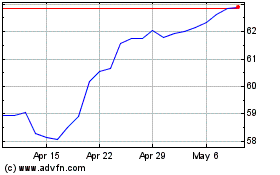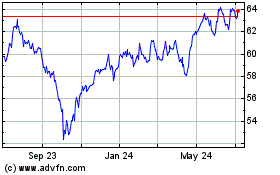Soda Consumption Falls After Special Tax in California City
August 23 2016 - 6:24PM
Dow Jones News
By Mike Esterl
Consumption of soda and other sugary drinks fell by more than a
fifth in low-income neighborhoods of Berkeley after the California
city became the first in the U.S. to introduce a special tax last
year, according to a study published Tuesday.
The peer-reviewed research is the first to measure the impact of
the penny-per-ounce tax. It found that consumption declined 21% and
many residents switched to water after the tax went into effect in
March 2015, according to the study published online in the American
Journal of Public Health.
The study states that the results "suggest" that the tax lowered
consumption but acknowledged other factors also could have been at
play, including increased awareness about the health impact of
sugary drinks.
The American Beverage Association, an industry group, said the
Berkeley study has flaws and there is no indication the tax has had
a measurable impact on public health. Street surveys relying on
people's recollections are "inherently unreliable," said Brad
Williams, an economist who does consulting work for the
association.
Even so, the study is likely to provide ammunition to
public-health officials pushing for similar levies in other parts
of the country.
The work focused on low-income neighborhoods because the
researchers at the University of California, Berkeley say obesity
and diabetes rates are higher, and price increases have a bigger
impact on purchasing patterns.
The findings were based on comparisons of interviews with
Berkeley residents in 2014 and then between April and August 2015.
At the same time, soft and sugary drink consumption in low-income
neighborhoods of San Francisco and Oakland rose 4%, according to
similar interviews conducted in those cities.
Consumption of bottled water or tap water rose 63% in Berkeley
during the period but a more modest 19% in San Francisco and
Oakland, according to the study, which asked residents how
frequently they drank different types of beverages.
The larger neighboring cities of San Francisco and Oakland are
expected to vote on a penny-per-ounce levy on sugary drinks in
November ballot initiatives, while Boulder, Colo., is weighing a
2-cent-per-ounce tax. Philadelphia's city council in June approved
a tax of 1.5 cents per ounce on sweetened drinks, becoming the
second U.S. city to pass such a measure.
Beverage giants Coca-Cola Co., PepsiCo Inc. and Dr Pepper
Snapple Group Inc. have argued that it is unfair to single out
sugary drinks because they represent less than 10% of caloric
intake. The companies have spent more than $100 million to defeat
proposed taxes in more than two dozen cities and states since 2009
and plan to challenge Philadelphia's planned tax in court before it
takes effect in January.
U.S. regulators also increasingly are taking aim at sugar. The
Food and Drug Administration announced new rules in May requiring
nutrition-facts panels to list how much sugar has been added and
the daily recommended maximum, which is about 30% less than in a
20-ounce bottle of Coke.
The long-term impact of special taxes on sugary drinks remains
unclear. In Mexico, which introduced a roughly 10% tax in January
2014, purchases dropped 6% the first year from the average of the
previous two years, according to a peer-reviewed study by Mexican
health officials and the University of North Carolina. But soda
volumes in the country began rising again in 2015.
Even without special taxes, U.S. soda sales volumes have
declined 11 straight years and per-capita consumption is at a
three-decade low, according to industry tracker Beverage
Digest.
Residents might understate their consumption of sugary drinks in
interviews because such drinks are seen as unhealthy, acknowledged
Kristine Madsen, an associate professor at UC Berkeley's School of
Public Health who co-wrote the study. But she noted 2015 was hotter
than usual, which typically would increase consumption.
Consumption of regular soda dropped 26% in Berkeley's low-income
neighborhoods after the tax, while energy drinks and sports drinks
fell 29% and 36%, respectively. Sweetened fruit drinks, coffee and
tea declined 13%.
The household median income in surveyed Berkeley neighborhoods
was $59,000, compared with $65,000 citywide. The neighborhoods also
skewed more heavily toward African-Americans and Latinos, who are
bigger drinkers of sugar-sweetened beverages, according to previous
studies.
Berkeley, a city of about 115,000 people, collected $1.4 million
from the sugary drink tax in the first 12 months. Residents voted
75% in favor of the tax in a November 2014 ballot measure.
A bit more than half of San Francisco residents in 2014 backed a
2-cents-per-ounce tax on sugary drinks, but the ballot measure fell
short of the required two-thirds support. This June, a federal
judge put on hold a city plan requiring health warnings for sugary
drink advertisements after the beverage industry argued the
requirement violated free-speech rights.
Write to Mike Esterl at mike.esterl@wsj.com
(END) Dow Jones Newswires
August 23, 2016 18:09 ET (22:09 GMT)
Copyright (c) 2016 Dow Jones & Company, Inc.
Coca Cola (NYSE:KO)
Historical Stock Chart
From Mar 2024 to Apr 2024

Coca Cola (NYSE:KO)
Historical Stock Chart
From Apr 2023 to Apr 2024
